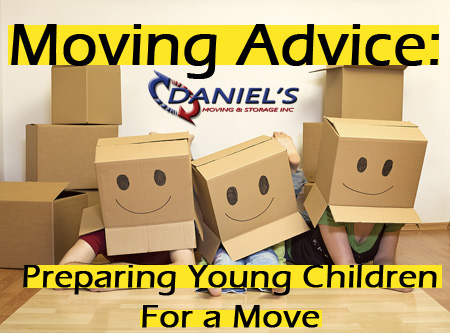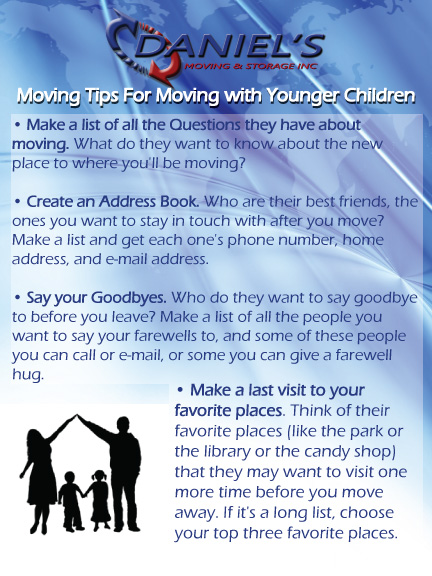General Advice for Telling Kids of All Ages You’re Moving:
Tell your kids as soon as possible. While it may be logical to assume that children will handle a move better with less time to think about it, the opposite is actually true. Experts say that kids of all ages need time to adjust to the thought of moving, and want to feel involved in the process of moving. So don’t hold off on telling them.
Answer their questions. Open communication between you and your children is important during this stressful and confusing time. Make sure your kids feel comfortable with the move and answer as many of their questions as possible. Also, pay attention to the questions they are asking, this should give you an idea of how well they are handling the move.
Stay positive. It’s important to keep in mind your attitude towards the move will influence your children. Even if you are dreading a move, be sure to keep a positive attitude and provide enthusiasm about new opportunities that will be in the future.
Keep them involved. Make sure every family member is involved in the move, whether it is planning and packing or ideas for the new home. Have children research the new city or neighborhood you will be moving to, i.e. what parks are nearby, restaurants, etc. By keeping children involved with the whole process of moving, they will ultimately feel more comfortable with it.
Telling Younger Children About a Move:
Younger children (up to age 9) will have different concerns about a move than older children. At this stage in life family is the most important concern, and it’s important to keep that in mind when moving. They’re biggest concern may be things like being left behind or getting lost. Keep an eye out for these concerns and treat them seriously. Here are a few tips on handling a move with children aged 9 and younger.
Explain the 5 W’s. Just as you would expect Daniel's Moving to explain a move thoroughly to you, make sure your child fully understands your move as well. Be sure to explain every aspect of the move especially the “who, what, when, where, and why”. Be short and to the point when explaining the details of the move.
Explain how the move benefits them. Younger children may not understand entirely why they are moving, but you can explain how it will affect them directly. You may want to tell them that there will be lots of new children there to make friends with, or that there will be new sports teams for them to join, etc. This will also give them something to look forward to.
Use pictures and maps. Visually show younger children where you are moving from and where you are moving to. Show them pictures of the new community and where their room will be. If you are moving far use a large map to show them the distance between your old house and new house. You may even show the route your taking to get there.Reassure them nothing is changing drastically. Make sure your child(ren) understand that some things will be the same at their new home and community. They will still be going to school and they will still have the same bedtime. Explain that any pets and toys or belongings are also coming with. Reassure them that they will find new friends and teachers at your new home.
Daniel's Quick Tips Graphic:


Comments